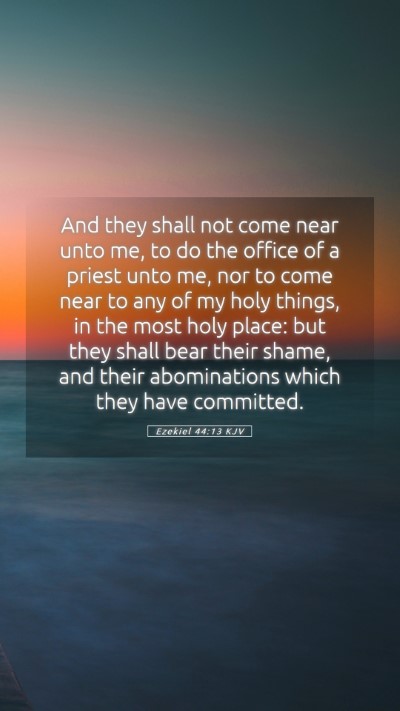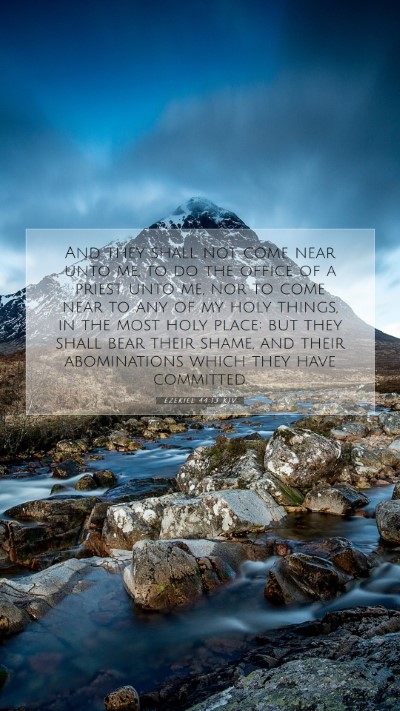Ezekiel 44:13 - Bible Verse Meaning and Interpretation
Ezekiel 44:13 states, "And they shall not come near unto me, to do the office of a priest unto me, nor to come near to any of my holy things, in the most holy place: but they shall bear their shame, and their abominations which they have committed." This verse offers valuable lessons regarding holiness, priestly duties, and accountability.
Bible Verse Meanings
In seeking to understand the meaning of Bible verses, this particular verse reveals the strict regulations placed upon the Levitical priests. The context of Ezekiel emphasizes God’s desire for holiness among His chosen servants. The priests mentioned here had defiled themselves by their actions, and as a result, they were restricted in their service.
Bible Verse Interpretations
- Historical Context: This passage emerges during a prophetic vision given to Ezekiel concerning the restoration of the temple and the restoration of Israel. The priests hold significant roles as intermediaries between God and the people, and their failure reflects broader issues within the community of Israel.
- Accountability: The mention of bearing shame signifies the weight of their iniquities. This highlights the importance of being in a state of righteousness to approach God's holiness.
Bible Verse Understanding
Matthew Henry notes that the refusal of these priests to approach God illustrates divine justice. Their previous sins would not allow them near the sanctum of worship, emphasizing the need for purity before God. Albert Barnes adds that this refusal is an essential part of the reform intended in Ezekiel's vision; the priests and the people needed to be aware of the drastic changes required for true worship.
Bible Verse Explanations
Adam Clarke observes that this scripture serves as a strong warning against spiritual complacency. It speaks to the seriousness of the priest’s office and the consequences of neglecting their sacred responsibilities. Clarke emphasizes a spiritual application that resonates with all believers today: approaching holy matters with reverence and responsibility.
Key Insights from Commentaries
- Matthew Henry: This verse illustrates the distinction between the self-exalted and those whom God has chosen, revealing His holiness and the need for priests to embody that in their lives.
- Albert Barnes: He interprets this as a call to awareness for priests concerning the nature of their identity and duties in society; failures incur severe spiritual repercussions.
- Adam Clarke: His commentary focuses on the necessary purity for service and the spiritual reality that one’s life must reflect God’s holiness to serve faithfully.
Related Bible Verses
- Leviticus 21:6: “They shall be holy unto their God, and not profane the name of their God...”
- Numbers 3:10: “And thou shalt appoint Aaron and his sons, and they shall wait on their priest's office...”
- Hebrews 10:29: “Of how much sorer punishment, suppose ye, shall he be thought worthy, who hath trodden under foot the Son of God...”
Application of the Scripture
In engaging with the text, one can derive significant Bible study insights. The passage beckons believers to evaluate their relationship with God and the seriousness of their commitments. Recognizing the significance of the priesthood in the Old Testament helps inform our understanding of Christ’s role as the ultimate High Priest in the New Testament.
Additional Considerations
For those studying this verse, consider the implications for Bible study groups. Discussions could revolve around the nature of God's holiness, the responsibilities leaders bear in their communities, and the need for personal integrity in worship.
Conclusion
Overall, Ezekiel 44:13 emphasizes that God's holiness cannot be approached lightly. The requirements set forth for the priests carry lessons that extend to all believers. Through careful Scripture analysis and thoughtful consideration of the meaning of this Bible verse, believers are equipped to live lives that honor God and embody His holiness.


